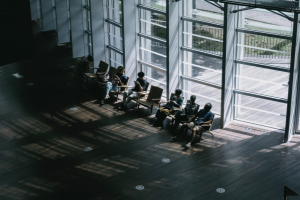Last week, a tense moment unfolded in Dutch politics when a decision had to be made about creating an emergency law for asylum seekers. Although the law didn’t go through, framing situations as a crisis and stigmatising groups of people does have far-stretching consequences.
The impact of implicit bias
Harvard psychologist Mahzarin Banaji has worked for years researching people’s implicit biases, which refers to the unconscious attitudes and stereotypes that influence our understanding, actions, and decisions. Banaji and her colleagues developed the Implicit Association Test (IAT), which measures unconscious or implicit biases by having participants quickly associate different concepts. For example, one of the large studies they did showed that a substantial number of Americans found it easier to associate white faces with positive concepts than to associate black faces with positive concepts. Many people were similarly quick to associate men with professional activities and slow to associate women with such activities.
“Numerous Americans appear to have negative associations about the elderly, the overweight, and the disabled. Crucially, large numbers of people taking the tests didn’t think of themselves as being prejudiced. Many prided themselves on having egalitarian beliefs. Their test results often came as a shock.”
Rising Islamophobia in Europe
Last week, a report by the European Union Agency for Fundamental Rights, found that discrimination against Muslims in Europe has “almost become normal,” with the Netherlands showing above-average levels of Islamophobia compared to other EU countries. 55% of Muslims in the Netherlands experience discrimination compared to an average of 47% of all Muslims living in Europe. In reaction to the findings of the report, the Volkskrant dove into possible reasons for this increase, like the election victory of Geert Wilders, which created a climate that encourages anti-Muslim sentiments, Meldpunt Islamofobie (an organization that monitors and reports incidents of Islamophobia in the Netherlands) has seen an increase in discrimination against Muslims, especially women, since the war in Gaza. In addition, negative media portrayals and a lack of reporting on discrimination incidents of Muslims themselves that are afraid that nothing will be done anyways are contributing to a growing Islamophobia.
The Role of Brands
Although it might feel like none of your business, brands and organizations have to be aware of the impact they can have as well on people’s brain print and implicit biases. We’re in charge of much of what people pay attention to, what we feel about certain things in society, and in the end how we’re likely to react based on that. It’s partly our responsibility but also a business opportunity to help heal societal divides. For example, advertising that goes beyond mere representation to active inclusion shows significant advantages in attention, sales lift, and brand equity (according to research by Ipsos in collaboration with the Effie Awards).
By making intentional choices to normalize differences and bridge divides, marketers can not only contribute to social cohesion but also drive long-lasting business effects. As society grapples with increasing feelings of polarization, brands that authentically address these issues through empathetic, audience-first approaches stand to gain consumer trust and loyalty while positively shaping the cultural landscape.
“Words have long held a sacred place in the history of magic, spirituality and creation. One such word, “abracadabra” often associated with childhood tales and conjuring tricks, carries much deeper roots than many of us may realize. Derived from the Aramaic phrase, “avra kehdabra” meaning “I will create as I speak”, this ancient word holds within it the essence of manifestation-reminding us that our words are not just sounds, but powerful tools capable of shaping our reality.”
– Obinna Nnajiba
Resources for further exploration:
→ Ipsos & the Effie Awards highlighted 4 case studies which highlight important lessons for any brand wanting to help heal the divide.
→ The climate change story has been too polarized and too overwhelming for most people to engage with.The Potential Energy Coalition’s mission is to help audiences better understand climate change through emotionally engaging narratives that put them at the center of the story — and inspire them to push for solutions.
→ VPRO Tegenlicht Rebranding Migration, a series on how we can create better narratives on migration (all in Dutch, excuse!)
→ In reaction to the so-called “asylum crisis” creative agency DENTSU created all kinds of posters to highlight the real crises that the Netherlands faces, and that are being overshadowed by the “asylum crisis.”

Author
Kim Pillen
Share the signal.











